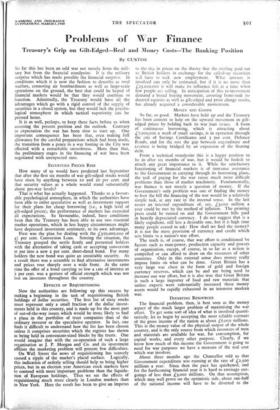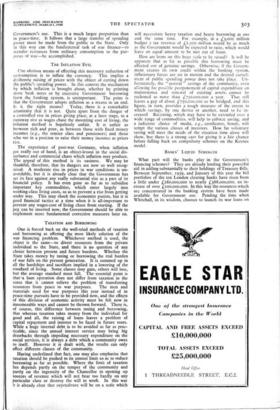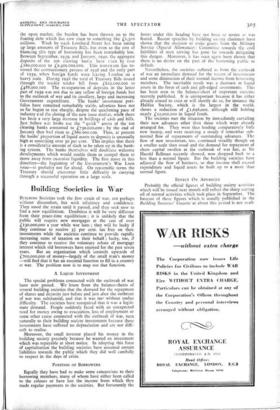Problems of War Finance
Treasury's Grip on Gilt-Edged—Real and Money Costs—The Banking Position
By CUSTOS So far this has been an odd war not merely from the mili- tary but from the financial standpoint. It is the military surprise which has made possible the financial surprise. In conditions which it is now the fashion to describe as total warfare, connoting air bombardment as well as large-scale operations on the ground, the best that could be hoped of financial markets would be that they would continue to function. Admittedly, the Treasury would have all the advantages which go with a rigid control of the supply of securities in a closed system, but they would lack the psycho- logical atmosphere in which tactical superiority can be pressed home.
It is as well, perhaps, to keep these facts before us when assessing the present position and the outlook. Contrary to expectation the war has been slow to start up. One important consequence has been that, even making full allowance for the careful preparations which had been made, the transition from a peace to a war footing in the City was effected with a remarkable smoothness. More than that, the preliminary stages in the financing of war have been negotiated with unexpected ease.
SECURITIES PRICES RISE How many of us would have predicted last September that after the first six months of war gilt-edged stocks would have risen by anything between I0 and 20 per cent. and that security values as a whole would stand substantially above pre-war levels?
That is what has actually happened. Thanks to a favour- able psychological atmosphere, in which the authorities have been able to enlist speculative as well as investment support for their plans for cheap borrowing (i.e., a high level of gilt-edged prices), the performance of markets has exceeded all expectations. So favourable, indeed, have conditions been that the Treasury has been able to use two essential market operations, which in less happy circumstances might have depressed investment sentiment, to its own advantage.
First was the plan for dealing with the £350,000,000 of 42 per cent. Conversion Loan. Sensing the situation, the Treasury grasped the nettle firmly and presented holders with the alternative of taking cash or accepting conversion at par into a new 2 per cent. short-dated bond. For many holders the new bond was quite an unsuitable security. As a result there was a scramble to find alternative investments and prices rose sharply over a wide front. At the same time the offer of a bond carrying so low a late of interest as 2 per cent. was a gesture of official strength which was not lost on investors throughout the country.
EFFECTS OF REQUISITIONING Now the authorities are following up this success by making a beginning in the task of requisitioning British holdings of dollar securities. The first list of sixty stocks must represent only a small fraction of the dollar invest- ments held in this country, and is made up for the most part of out-of-the-way issues which would be more likely to find a place in the portfolios of trust companies than of the ordinary investor or the speculative operator. In fact, one finds it difficult to understand how the list has been chosen unless it comprises securities which the register has shown as being held in convenient-sized blocks by the trusts. One would imagine that with the co-operation of such a large organisation as J. P. Morgan and Co. and its investment affiliate the marketing problem will present few difficulties. On Wall Street the news of requisitioning has scarcely caused a ripple of the market's placid surface. Logically, this indication of orderly selling should help to bring higher prices, but in an election year American stock markets have to contend with more. important problems than the liquida- tion of European holdings. Thus we see the effects of requisitioning much more clearly in London markets than in New York. Here the result has been to give an impetus to the rise in prices on the theory that the sterling paid out to British holders in exchange for the called-up securities will have to seek new employment. What amount is involved can only be estimated, but if it is no more than £25,000,000 it will make its influence felt at a time when few people are selling. In anticipation of this re-investment demand a broad buying movement, covering front-rank in- dustrial equities as well as gilt-edged and prior charge stocks, has already acquired a considerable momentum.
MONEY AND GOODS So far, so good. Markets have held up and the Treasury has been content to help on the upward movement in gilt- edged prices by holding back its war loan issues. A form of continuous borrowing, which is attracting about £7,000,000 a week of small savings, is in operation through the sale of Savings Certificates and 3 per cent. Defence Bonds, and for the rest the gap between expenditure and revenue is being bridged by an expansion of the floating debt.
From a technical standpoint this is a happy position to be in after six months of war, but it would be foolish to attach any great importance to it. While the satisfactory functioning of financial markets is of immense assistance to the Government in carrying through its borrowing plans, the task of paying for the war raises much more difficult problems than those of market machinery. Fundamentally, war finance is not merely a question of money. If the Government's only problem was one of finding the money to foot the bill the financing of the war would be a relatively simple task, at any rate in the internal sense. In the last resort an internal expenditure of, say, £3,000 million a year could be met by the method of inflation. The printing press could be turned on and the Government bills paid in heavily depreciated currency. I do not suggest that is a likely expedient, still less a desirable one, but it is high time many people ceased to ask: How shall we find the money? it is not the mere provision of currency and credit which sets limits to a nation's war effort.
The truth is, of course, that war effort is conditioned by factors such as man-power, production capacity and powers of organisation, except, of course, in so far as a nation is compelled or can afford to draw on the resources of other countries. Only in this external sense does money really impose limits on what can be done. Great Britain has a very large war chest in the form of gold and foreign currency reserves, which can be and are being used to increase our war effort, but it is also true that Great Britain is such a large importer of food and raw materials that unless exports were substantially increased these money assets would be rapidly exhausted in an intensive modern war.
DIVERTING RESOURCES The financial problem, then, is best seen as the money aspect of the much larger problem of maximising the war effort. To get some sort of idea of what is involved quanti- tatively, let us begin by accepting the most reliable estimate of the gross income of the nation as about £6,000 millions. This is the money value of the physical output of the whole country, and is the only source from which resources of men and materials are available for war, for consumption, for capital works, and every other purpose. Clearly, if we know how much of this income the Government is going to need for war purposes we have a measure of the real cost which war involves.
About three months ago the Chancellor told us that Government expenditure was running at the rate of £2,500 millions a year. Since then the pace has quickened, and for the forthcoming financial year it is hard to envisage out- goings of less than £3,000 millions. On that assumption, which may well prove on the optimistic side, about one-half of the national income will have to be diverted to the Government's use. This is a much larger proportion than in peace-time. It follows that a large transfer of spending power must be made from the public to the State. Only in this way can the fundamental task of war finance—to transfer resources from ordinary consumption to the pur- poses of war—be accomplished.
THE INFLATION EVIL
One obvious means of effecting this necessary reduction of consumption is to inflate the currency. This implies a deliberate raising of prices with the object of cutting down the public's spending power. In this context the mechanism by which inflation is brought about, whether by printing more bank notes or by excessive Government borrowing from the banking system, is unimportant. The point is that the Government adopts inflation as a means to an end. Is it the right means? Today, there is a remarkable unanimity that it is not. Quite apart from the danger of a controlled rise in prices giving place, at a later stage, to a runaway rite as wages chase the mounting cost of living, the inflation method is hopelessly unfair. It is unfair as between rich and poor, as between those with fixed money incomes (e.g., the rentier class and pensioners) and those who are in a position to raise their money incomes as prices rise.
The experience of post-war Germany, when inflation got really out of hand, is an object-lesson in the social dis- turbance and commercial chaos which inflation may produce. The appeal of this method is its easiness. We may be thankful, therefore, that its dangers are now so well recog- nised. A moderate rise in prices in war conditions is un- avoidable, but it is already clear that the Government has set its face against any really substantial rise as a part of its financial policy. It has even gone so far as to subsidise important key commodities, which enter largely into working-class living costs, so as to prevent a rise from getting under way. This may shock the economist purists, but it is good financial tactics at a time when it is all-important to prevent any wages-cost of living chase from starting. If the peg can be inserted now, the Government should be able to implement more fundamental corrective measures later on.
TAXATION AND BORROWING
One is forced back on the well-tried methods of taxation and borrowing as offering the most likely solution of the war financing problem. Whichever method is used, the object is the same—to divert resources from the private individual to the State, and there is no question of any choice between present and future burdens. Whether the State takes money by taxing or borrowing the real burden of war falls on the present generation. It is summed up in all the hardships and sacrifices implied in a lowering of the standard of living. Some classes may gain, others will lose, but the average standard must fall. The essential point is that4a loan operation does not differ from taxation in the sense that it cannot relieve the problem of transferring resources from peace to war purposes. The men and materials used for war purposes this year instead of in peace-time pursuits have to be provided now, and the effects of this division of economic activity must be felt now in innumerable ways and cannot be thrown forward. There is, of course, this difference between taxing and borrowing, that whereas taxation takes money from the individual for good and all, the raising of loans leaves a problem of capital repayment and interest to be faced in future years. While a huge internal debt is to be avoided as far as prac- ticable, since the annual interest service may bring big drawbacks through impeding necessary expenditure on the social services, it is always a debt which a community owes to itself. However it is dealt with, the results can only affect different classes of the community.
Having underlined that fact, one may also emphasise that taxation should be pushed to its utmost limit so as to reduce borrowing as far as possible. Where the limit of taxation lies depends partly on the temper of the community and partly on the ingenuity of the Chancellor in opening up sources of revenue which will not bear too hardly on any particular class or destroy the will to work. In this war it is already clear that expenditure will be on a scale which will necessitate heavy taxation and heavy borrowing at one and the same time. For example, in a £3,000 million budget a tax revenue of £1,500 million would be as much as the Government would be expected to raise, which would leave an equal amount to be met out of loans.
How are loans on this huge scale to be raised? It will be apparent that as far as possible this borrowing must be effected out of genuine savings. Otherwise, if the Govern- ment creates its own credit within the banking system, inflationary forces are set in motion and the desired curtail- ment of public spending power does not take place. Un- fortunately, the " normal " savings of the community, even allowing for possible postponement of capital expenditure on maintenance and renewal of existing assets, cannot be reckoned as more than £750,000,000 a year. That still leaves a gap of about £750,000,000 to be bridged, and this figure, in turn, provides a rough measure of the extent to which savings, by one device or another, need to be in- creased. Rationing, which may have to be extended over a wide range of commodities, will help to enforce saving, and a judicious choice of media, e.g., certificates, bonds, will tempt the various classes of investors. How far voluntary saving will meet the needs of the situation time alone will show, but there is a strong case for giving it a fair chance before falling back on compulsory schemes on the Keynes model.
BANKS' LIQUID STRENGTH
What part will the banks play in the Government's financing schemes? They are already lending their powerful aid in adding substantially to their holdings of Treasury Bills. Between September, 1939, and January of this year the bill portfolios of the ten London clearing banks have risen from a little under £280,000,000 to nearly L388,000,000, an in- crease of over oo,000,000. In this way the resources which are concentrated in the banking system have been made available for Government use. Pending the time when Whitehall, in its wisdom, chooses to launch its war loans on the open market, the burden has been thrown on to the floating debt which has now risen to something like £1,500 millions. Week by week Lombard Street has been taking up large amounts of Treasury Bills, but even so the cost of financing this type of borrowing has been remarkably low. Between September, 1939, and January, 1940, the aggregate deposits of the ten clearing banl:s have risen by over £160,000,000 to £2,409,000,000. This movement has re- versed the contractionary process of 1938 and the early part of 1939, when foreign funds were leaving London on a heavy scale. During 1938 the total of Treasury Bills issued through the weekly tender fell from 1,622,coopoo to £488,000,000. The re-expansion of deposits in the latter part of 1939 was not due to any reflow of foreign funds but to the outbreak of war and its corollary, large and increasing Government expenditure. The banks' investment port- folios have remained remarkably stable, advances have not so far begun to rise sharply, despite the quickening pace of industry aad the closing of the new issue market, while there has been a very large increase in holdings of cash and bills. Just before war broke out the " quick " assets of the- ten clearing banks amounted to £730,000,000 ; by the end of January they had risen to L860000000. Thus, at present the banks' proportion of liquid assets to deposits is unusually high at something over 3o per cent. This implies that there is a considerable amount of slack to be taken up in the bank- ing system. The banks themselves will doubtless welcome developments which would enable them or Compel them to move away from excessive liquidity. The first move in this direction—the beginning of the Government's War Loan issue—is probably not far ahead. On reasonable terms the Treasury should encounter little difficulty in carrying through a successful operation on a large scale.
















































 Previous page
Previous page